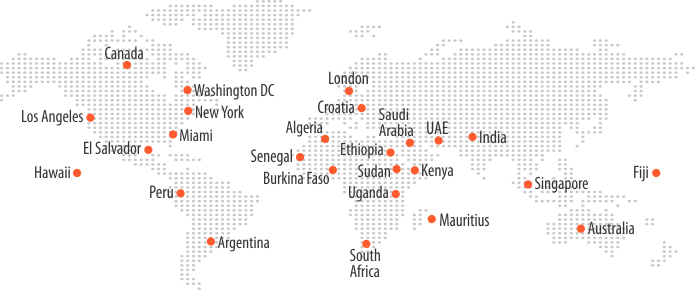Top 10 VoIP Trends Powering Communications in 2023

The VoIP market has significantly revolutionized communication over the last 20 years. Wholesale VoIP termination has become one of the cornerstones for many companies as it makes it easy to manage high call volumes with premium-quality voice and competitive rates. Besides, technological advancements enable improved and round-the-clock customer support with value-added features.
A study found that a converged VoIP technology solution based on unified communications can save 32 minutes of calls per day per team member. This efficiency can be attributed to the flexibility, availability, and scalability that A-Z VoIP termination offers. As digital technology continues to rise, upcoming VoIP trends will offer business benefits that value-added resellers and wholesale VoIP providers couldn’t have imagined until a few years ago.
Let’s see some of the top VoIP trends that will shape the future of the communications industry in the upcoming years.
Top 10 VoIP Trends Powering the New Age of Communications in 2023
5G Connectivity Leading to Superior Quality of Service
Fifth-generation wide-area wireless networks are poised to transform internet connectivity as we know it. 5G implementation doesn’t only mean faster speed, especially for VoIP calls. With 5G, businesses will be better positioned to handle moments of high usage far better than 4G, eliminating call jitter and packet loss during data transfer.
The increased network capacities will offer better packet prioritization, reliability, and superior network availability. 5G will optimize wholesale VoIP termination through network slicing, which isolates virtualized, end-to-end networks tailored to fulfill the requirements of a particular application. Besides, 5G has introduced a high-definition voice CODEC called EVS (Enhanced Voice Services) that senses and adapts to network conditions in real time.
Omnichannel Customer Support
The omnichannel support in the VoIP system will help organizations break down silos and deliver customer-centric communications. Calls will be just one part of the customer support parcel, including tweets, live chat, and emails.
The next-gen A-Z VoIP termination services will leverage VoIP data to promote consistency and a unified customer experience. No matter where users interact with a brand, VoIP will turn data from calls into actionable, searchable text and make queries on the web app, text, and other channels available to the call center.
More Innovative Ways to Use APIs and Webhooks
APIs (Application Programming Interfaces) will be the key to any customization you need with VoIP solutions. Using APIs, you can enable value-added features while adding calling capabilities to CRM and helpdesk tools, such as Zoho, HubSpot, Zendesk and more.
Using Webhooks, you can drive further into automation. It works similarly to APIs, serving as a means for applications to communicate with each other. Webhooks are automated messages that applications exchange when an event occurs. For instance, you can use Webhooks to connect VoIP API with your website to send customers A2P SMS whenever new posts are published.
Sentiment Analysis, Data Classification, and More through AI
Several wholesale VoIP providers offer AI-backed sophisticated solutions that can streamline sales procedures and improve threat protection. One of the most promising trends in VoIP services is AI-powered sentiment analysis based on natural language processing. It can analyze VoIP call data and extract insights into customers’ feelings. It will process the words spoken in the calls to detect meanings and possibly opinions and emotions.
The role of AI in VoIP services will continue to grow as it will help businesses organize and classify unstructured data into actionable insights as a smart assistant for call agents. It will also enable functionalities that automatically classify and allocate incoming calls and requests based on required agent competency, skill set, and urgency.
VoIP Security Claiming the Center-stage
VoIP security becomes more central as voice becomes another application on your data network. The risk of intercepted calls and unauthorized use of the system is only one part of VoIP security. There is also a risk of the VoIP system hacking into other parts of the company for data theft or other social engineering attacks.
VoIP providers are expected to introduce more powerful multi-layer security this year. Beyond passwords, encryption, biometrics, and multi-step authentication, VoIP security will rely upon blockchain technologies and decentralize control over the VoIP system and network.
VoIP to Support Connected and Smart Workspaces
VoIP devices will no longer revolve just around voice and video packets. The Internet of Things (IoT) will ensure that VoIP remains relevant in the future with all its endpoints interconnected. As VoIP technology grows more sophisticated, it will play a crucial role in simplifying data exchange between all internet-capable devices.
Companies can set up smart offices and workspaces that collect all data from office equipment so that employees can have all the information they need on their VoIP mobile app. A more complex use case can be a voice-activated workspace where you can ask the VoIP device to record the video conference.
Increasing Adoption in the Academic Sector
More schools and universities are realizing the potential of VoIP in managing the unified communications required within their structure. To begin with, institutions now use VoIP systems to enhance the online learning experience. It can be an excellent platform for class collaboration, conducting seminars, and other supplementary classes without having to be present physically. The trend will rise as the demand for mobility increases among students, parents, educators, and administrators.
Improved Personalization with CRM Integrations
Customer relationship management software (CRM) can be integrated with VoIP systems to create personalized experiences. CRMs let you manage clients and leads and help you track interactions by storing critical customer information. CRM integration with VoIP solutions equips your agents with readymade communications templates for businesses of all sizes.
Some integrations enable robust features, like real-time call monitoring, click-to-call, pop-up alerts, and smart contact management. Integrations with some CRM software allow you to access critical customer insights like calling patterns and preferences from the dashboard. CRM integrations can also make automated suggestions and solutions to customers through an AI-backed VoIP chatbot.
Unified Communications at Peak
The remote work trend has taken unified communications to new heights as distributed teams replaced in-person meetings and business travel with digital conversations, especially team chats and video conferencing. The UCaaS (Unified Communications as a Service) model in the VoIP system optimizes efficiency and productivity by converging customer channels and team collaboration tools in one place. It allows team members to reach each other more conveniently. Moreover, from the business perspective, UCaaS help brands accommodate customers more quickly.
VoIP collaboration with WebRTC
WebRTC is a framework providing web browsers and mobile applications with real-time communications using simple APIs. Initially, it was believed to be a negative disruptor of VoIP technology, but the tables have turned now. WebRTC can contribute significantly to the VoIP system since it’s an open-source project, implying more flexibility. For instance, WebRTC can enhance the VoIP experience by enabling live video support and instant, direct call from the web browser. Users will no longer have to install extra plugins and widgets for various business communication functions, such as peer-to-peer file swapping.
Be Technologically Ready for Disruption with the Latest VoIP
The industry is looking ahead to implement future technologies in VoIP systems. VoIP has always been scalable, flexible, and cost-effective, with the ability to direct calls quickly to the desired person, no matter their location. However, businesses must prepare themselves with the latest wholesale VoIP termination services to harness the power of new-age communications. A feature-rich VoIP system of today will pave the way for seamless future developments that will offer radically higher call quality and much better integrations with a full suite of communication tools your business uses.
Bankai Group helps telecom operators and carriers offer global coverage to their customers with the highest quality of wholesale A-Z VoIP termination services and a team of experts persistently working toward providing personalized support during the entire customer lifecycle.
Related Posts
Redefine Customer Support Excellence with VoIP: The Ultimate Guide
The Emergence of VoIP, Its History, and What the Future Holds






